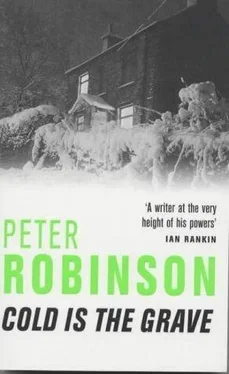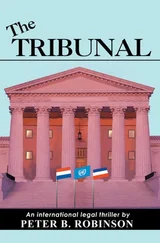When it came to the make of car, they all looked the same to the witness. All she could say was that it was light in color. She also hadn’t noticed anything in the least bit odd about what she saw; the girl had seemed to know the driver and smiled as she got in, as if, perhaps, she had been waiting for the lift. No, she hadn’t really got a glimpse of the driver at all, except that maybe he or she was fair-haired.
So, if their witness was to be believed, Emily had got into a light-colored car with someone she probably knew and trusted around the time of the meeting she had mentioned at lunch. She had left the Black Bull shortly before half past two. DC Templeton had checked the bus timetable and discovered that she must have taken the quarter-to-three to get there on time.
If – and it was a big if – their witness was right, then the sighting raised several interesting points. Banks walked over to his office window and lit an illicit cigarette. The day was overcast but balmy for the time of year. A crew of borough workers were putting up the Christmas tree in the market square, watched by a group of children and their teacher. The high-pitched whine of some sort of electric drill came from the extension down the corridor. It reminded Banks of the dentist’s, and he gave a little shudder.
In the first place, Banks thought, why was Emily meeting someone on the edge of town rather than in another pub or in the Swainsdale Centre? Especially if this someone had a car and could easily drive into the town center. Answer: Because she was meeting someone who intended to kill her and who had insisted on the arrangement because he or she didn’t want to be seen with Emily. Any secrecy could easily be explained by the fact that drugs were being sold.
Objection: If this person wanted to kill Emily, why not drive her into the country and do it at leisure, then bury her body where it would never be found?
That raised the whole issue of the way she was killed. Poison, or so the cliché goes, is a woman’s weapon. In this case, if Emily’s killer hadn’t been in the Bar None at the time of her death, then the murder had also occurred at some distance from the killer. That suggested someone who wanted to get rid of her but didn’t have any particular emotional stake in seeing her die. On the other hand, the use of strychnine as a method implied someone who wanted Emily to suffer an agonizing and dramatic death. There are far easier and less painful ways of getting rid of a pest. The murder had elements of both calculation in its premeditation and extreme sadism in its method, a profile which might easily fit Barry Clough, the gangster who didn’t like to lose his prized possessions. But would Clough drive all the way from London simply to give Emily some poisoned cocaine because she had insulted his macho vanity? He had said he was in Spain at the time, and Banks was having that checked. It wouldn’t be easy, given how lax border crossings were these days, but they could tackle the airlines first, and then find out if any of his neighbors in Spain had seen him.
Also, while strychnine wasn’t as difficult to get hold of as some poisons, it wasn’t exactly on sale in the local chemist’s shop. Banks had looked it up. Strychnine, derived originally from the seeds of the nux vomica tree, which grows mainly in India, was used mostly as a rodenticide. It had some medical uses – vets used it as a mild stimulant, for example, and it was sometimes used in research, to cause convulsions in experiments for antiseizure drugs, and in the treatment of alcoholism. None of Banks’s suspects was a doctor or a nurse, and strychnine wasn’t issued on prescriptions, so the medical side could be ruled out. Craig Newton was a photographer, and they sometimes had access to unusual chemicals, though not, as far as Banks could remember, strychnine. Barry Clough could no doubt get hold of anything he wanted.
Then there was Andrew Handley to consider: “Andy Pandy,” Clough’s gofer, the one he had “given” Emily to the night she fled to Banks’s hotel. Such rejection could have driven Handley to revenge, if he was that kind of person. Burgess had said he would put some men on trying to track down Handley, so maybe they would get a chance to ask him soon.
But would Emily have smiled as she got in his car with either Clough or Handley? Christ, why hadn’t Emily told Banks whom she was going to meet? Why hadn’t he asked her? He rested his forehead against the cool glass and felt the vein throb in his temple.
It was no good, Banks decided; he needed far more information before he could even speculate about what had happened. He had found nothing of use in the contents of her handbag, once they had been gathered up and bagged. Nothing but the usual: cigarettes, tampons, electronic organizer, keys, a purse with £16.53 in it, makeup, a crumpled film magazine, an old family photograph – probably the one Ruth Walker had mentioned – Ruth’s driving license, which she hadn’t even really needed anymore, and the fake proof-of-age card.
The SOCOs had turned up nothing of interest from the ladies’ toilet in the Bar None, except for any number of unidentified pubic hairs, and there were no prints except Emily’s on the glassine bag in which the cocaine and strychnine had been kept. There were hundreds of prints around the stall – which testified to the frequency with which the owners thought it necessary to clean the toilets – but Banks suspected they would come to nothing. He was convinced that the killer, whoever it was, hadn’t been in the Bar None toilets either with or without Emily, and had not even been in the club at the time of her death – had probably never been there. This was murder from a distance, perhaps even death by proxy, which made it all the more bloody difficult to solve.
DC Templeton had come up with a lead on the couple seen leaving the Bar None at ten forty-seven. A bartender at the Jolly Roger pub, a popular place for the student crowd on Market Street, seemed to remember them being in the pub earlier that evening. She had seen them before, she said, but didn’t know their names; she only recognized the way they were dressed and thought they were students at the college, like most of her customers.
Next, Banks turned his mind to Charlie Courage’s murder and felt a singular lack of progress there, too. Charlie’s murderer had been at the scene, of course, but Charlie himself had been far from home, in the middle of nowhere. The only solid piece of evidence was the tire track, and that would be no use at all unless a corresponding car could be found. He decided to phone DI Collaton later in the day and see if anything had turned up at the Market Harborough end. Maybe he could have a word with DI Dalton, too, see if he had come up with anything more on PKF Computer Systems.
Banks stubbed out his cigarette in his wastebin, making sure it was completely dead, and tried to clear the air as best he could by opening the window and waving a file folder about.
When someone knocked at the door and walked in, he felt guilty, like the time his mother noticed ash from his cigarette on the outside window ledge of his room and stopped his pocket money. But it was only Annie Cabbot. He had asked her to drop by his office as soon as she had finished handing out actions to the newly drafted DCs that Red Ron McLaughlin had promised.
She looked particularly good this morning, Banks thought, her shiny chestnut hair falling in waves over her shoulders, her almond eyes serious and alert, though showing just a hint of wariness. She was wearing a loose white shirt and black denim jeans, which tapered to an end just above her ankles, around one of which she wore a thin gold chain.
“Annie. Sit down.”
Annie sat and crossed her legs. She twitched her nose. “You’ve been smoking in here again.”
Читать дальше












